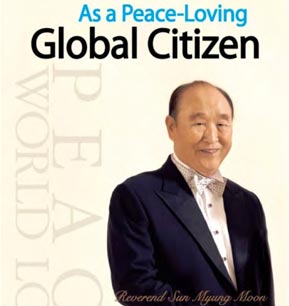ShareThis
Rev. Sun Myung Moon

As a Peace-loving Global Citizen is the autobiography of Rev. Sun Myung Moon, the founder of the Unification Movement. It was published in 2009 in both Korean and English by Gimm-Young Publishers of Seoul, South Korea. The book was released in South Korea on March 9, 2009 and debuted at #3 on the Businesss bestseller's list. It has ranked in various bestseller lists since then and was ranked 15th on the General bestseller's list as of October 14, 2009.
My Meeting with President Kim Il Sung
I spent a little more time telling him about my visit to my hometown, and appealed to his love for the Korean people. He and I spoke the same dialect, so we were at ease with one another.
President Kim responded, “I feel the same way. From next year, let’s begin a movement that allows separated compatriots of North and South to meet one another.” His acceptance of my proposal was as natural as the snow melting in spring.
After speaking of my visit to Jeong-ju, I moved on to my views on nuclear weapons. I respectfully proposed that North Korea agree to a declaration on the denuclearization of the Korean peninsula and sign a safeguards agreement with the International Atomic Energy Agency.
President Kim responded with candor, “President Moon. Think for a moment. Who am I going to kill by making nuclear weapons? Kill my own people? Do I look like that kind of person? I agree that nuclear energy should be used only for peaceful purposes. I have listened attentively to what you have to say, and I expect it will be all right.”
At the time, North-South relations were at a difficult point over the issue of nuclear inspections in North Korea, and so I had made my proposal with some reluctance. Everyone present, however, was surprised that President Kim responded in such a pleasant tone. At this point, we adjourned our meeting to a dining room, where we took an early lunch.
“President Moon, are you familiar with ‘frozen potato noodles’? It’s a dish I ate quite often when I was active as a partisan on Mount Baekdu. Please try some.”
“Well, of course I know it,” I said, responding to his words with delight. “We used to enjoy this dish in my hometown.”
“Well, I’m sure in your hometown you ate it as a delicacy,” he continued. “I ate it to survive. The Japanese police used to search for us all the way to the top of Mount Baekdu. We didn’t have a chance to sit down to a decent meal. What else is there to eat at the top of Mount Baekdu other than potatoes?
Monday, December 13, 2010
|
Labels:
My Meeting with President Kim Il Sung part2
|
CONTENT
- FOREWORD
- CHAPTER ONE - Food is Love
- CHAPTER TWO - A River of Heart Flows with Tears
- CHAPTER THREE - The Man with the Fullest Stomach
- CHAPTER FOUR - Why We Work Globally
- CHAPTER FIVE - True Families Create True People
- CHAPTER SIX - Love Will Bring Unification
- CHAPTER SEVEN - Future of Korea, Future of the Wor...
- CHAPTER EIGHT - Message for Young People

